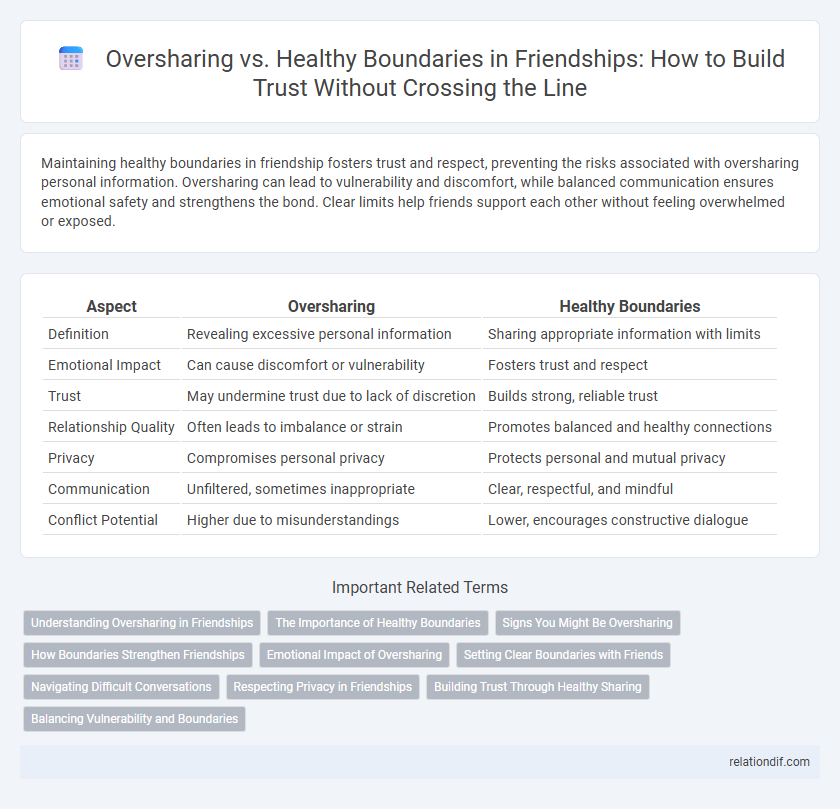Maintaining healthy boundaries in friendship fosters trust and respect, preventing the risks associated with oversharing personal information. Oversharing can lead to vulnerability and discomfort, while balanced communication ensures emotional safety and strengthens the bond. Clear limits help friends support each other without feeling overwhelmed or exposed.
Table of Comparison
| Aspect | Oversharing | Healthy Boundaries |
|---|---|---|
| Definition | Revealing excessive personal information | Sharing appropriate information with limits |
| Emotional Impact | Can cause discomfort or vulnerability | Fosters trust and respect |
| Trust | May undermine trust due to lack of discretion | Builds strong, reliable trust |
| Relationship Quality | Often leads to imbalance or strain | Promotes balanced and healthy connections |
| Privacy | Compromises personal privacy | Protects personal and mutual privacy |
| Communication | Unfiltered, sometimes inappropriate | Clear, respectful, and mindful |
| Conflict Potential | Higher due to misunderstandings | Lower, encourages constructive dialogue |
Understanding Oversharing in Friendships
Oversharing in friendships occurs when personal information is disclosed excessively or in inappropriate contexts, potentially causing discomfort or strain. Healthy boundaries involve sharing thoughts and feelings in a balanced manner that respects both parties' privacy and emotional capacity. Recognizing these limits helps maintain trust and mutual respect, preventing misunderstandings and preserving the friendship's integrity.
The Importance of Healthy Boundaries
Maintaining healthy boundaries in friendship fosters trust and respect, preventing emotional burnout and misunderstandings. Clear limits help friends share openly without oversharing, preserving individual privacy and promoting balanced support. Establishing these boundaries strengthens the relationship by encouraging mutual care and personal well-being.
Signs You Might Be Oversharing
Constantly divulging personal details early in new friendships or feeling the need to share every thought and emotion can indicate oversharing. Experiencing discomfort or regret after revealing sensitive information suggests a lack of healthy boundaries in communication. Friends noticing that you disclose too much or withdrawing slightly may serve as social cues signaling the need to reevaluate what and how much you share.
How Boundaries Strengthen Friendships
Setting clear boundaries fosters trust and respect in friendships by defining personal limits and preventing feelings of discomfort or resentment. Healthy boundaries encourage open communication and emotional safety, allowing friends to share authentically without oversharing or feeling overwhelmed. Maintaining these boundaries cultivates deeper connections and long-lasting, balanced relationships built on mutual understanding.
Emotional Impact of Oversharing
Oversharing in friendship often leads to emotional exhaustion and blurred personal boundaries, which can cause discomfort and strain in the relationship. Friends may feel overwhelmed, reducing their ability to provide support or maintain trust. Establishing healthy boundaries preserves mutual respect and emotional stability, fostering a more balanced and enduring connection.
Setting Clear Boundaries with Friends
Setting clear boundaries with friends establishes mutual respect and prevents emotional exhaustion. Defining limits around personal topics ensures conversations remain comfortable and supportive, promoting trust and longevity in friendships. Maintaining these boundaries encourages open communication while safeguarding individual well-being.
Navigating Difficult Conversations
Navigating difficult conversations in friendship requires balancing honesty with respect, ensuring that personal boundaries are maintained without oversharing sensitive information. Establishing clear limits on what topics are appropriate helps preserve trust and emotional safety between friends. Effective communication skills, such as active listening and empathetic responses, support healthier interactions and deeper mutual understanding.
Respecting Privacy in Friendships
Respecting privacy in friendships is essential for maintaining trust and mutual respect, as oversharing can lead to discomfort and vulnerabilities being exploited. Healthy boundaries allow friends to feel safe and valued, ensuring conversations remain supportive without crossing personal limits. Establishing clear limits fosters a balanced relationship where both parties can share openly yet preserve their individuality.
Building Trust Through Healthy Sharing
Building trust in friendships requires balancing openness with healthy boundaries, ensuring that personal information is shared thoughtfully and respectfully. Oversharing can lead to discomfort and weaken the relationship, while intentional, meaningful disclosures foster mutual understanding and respect. Establishing clear limits on what and when to share enhances emotional safety and strengthens authentic connections.
Balancing Vulnerability and Boundaries
Balancing vulnerability and boundaries in friendship requires sharing personal experiences while respecting limits that protect emotional well-being. Healthy boundaries prevent oversharing, fostering trust and mutual respect without risking discomfort or exploitation. Maintaining this balance encourages authentic connections and strengthens long-term friendship resilience.
Oversharing vs healthy boundaries Infographic

 relationdif.com
relationdif.com